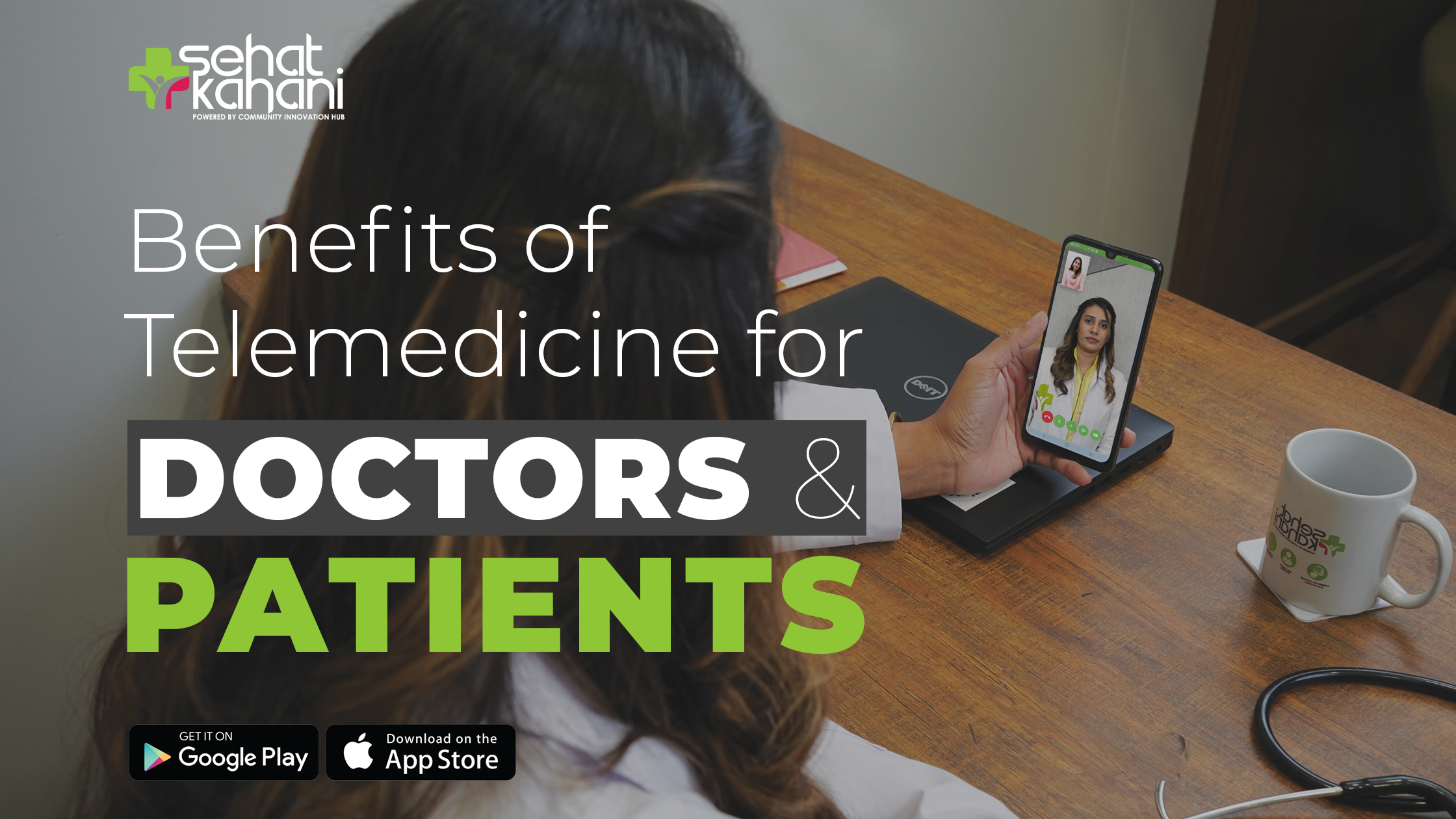
Introduction
Telemedicine is the allocation of healthcare services utilizing electronic media and modern telecommunication advancements. Diagnosis and monitoring are two examples of remote healthcare services referred to as telemedicine. It may close the gap and offer mediums for distance learning, meetings, supervision, and presentations between practitioners. It enables online information, health data management, and healthcare system integration. It also helps patients in rural areas access quality healthcare when a lack of transportation, a lack of mobility, conditions brought on by outbreaks, epidemics, or pandemics, and decreased funding limits their access to healthcare.
The concept of telemedicine has been around for some time. However, the emergence of the coronavirus and the global pandemic greatly prevailed it. During the global lockdowns due to the COVID-19 disease, everyone was vulnerable to catching the virus meanwhile healthcare was still a necessity. In such instances, taking online doctor help was of great use, whether to diagnose and treat COVID-19 disease or to manage already existing long-termed diseases.
The following 6-minute read contains different ways in which telemedicine is advantageous for both doctors and patients.
Benefits of telemedicine for doctors
The benefits telemedicine gives to doctors are often overlooked. Following are some major ways telemedicine benefits doctors and health care professionals.
Increased access to care
There is no doubt that a shortage of clinicians exists globally. The medical staff required by many hospitals and physician practices is lacking. Access to care can be increased by providing nursing advice lines and medical call centers which will eradicate overcrowded waiting areas with annoyed and sick patients. In this case, telemedicine can increase access to care for patients in remote locations, establish connections with individuals outside the delivery system, and prioritize patient symptoms to help decide when they require medical attention. Additionally, patients can use telemedicine to get cutting-edge treatment from doctors across the nation.
Increased income
The modernization and convenience that telemedicine brings to the healthcare industry attract new patients. There is a high chance of a person to deliberately ignore their symptoms or postpone their appointments to which they have to drive to or have to take a day off for. In contrast, telemedicine provides an easy and at-home solution to these hassles of the patients. This increases the number of consultations thus improve doctors’ income. Online consultations take lesser time enabling doctors to consult more patients within the given bracket of time.
Increased patient satisfaction
Before visiting your office, prospective patients will likely research you online. By providing quicker wait times and more easy access to care, telemedicine services may raise your patient satisfaction ratings. For instance, a Harvard study found that patients only spent 20 minutes of each doctor visit—a total of 121 minutes—with the doctor. Reduce wait times and provide convenient virtual healthcare to boost patient satisfaction.
Cost reduction
Telemedicine majorly reduces the overall costs for doctors. By taking online consultations, doctors can save a significant amount on the rent and maintenance of the clinic. Another cost-effective aspect of telemedicine is that it saves transportation costs for doctors. According to a 2017 study, telemedicine sessions cost patients $79 on average, vs $146 for an office visit.
Digitalization saves time
A doctor’s profitability is affected by a variety of factors, and inefficiency is a significant one. When technology wasn’t advanced enough to automate activities, manual procedures were the best choice. However, digitization, business process automation, and technology improvements give the chance to automate tedious work and cut down on mistakes. Digitalization ensures enhanced productivity, return on investment, and time management. The time saved from the digitalization of healthcare can be used otherwise for something more productive. The doctor can use this time to get more consultations or to continue their learnings etc.
Protection against infectious diseases
Remote consultations diminish the chances of doctors catching infectious diseases from their patients. This was another reason behind the popularity of telemedicine during the pandemic as the front-line health workers were at the highest risk of catching the coronavirus. Doctors can use telemedicine consultations to prescreen patients for potential infectious diseases to stop the spread of COVID-19, the flu, and other contagious diseases. Additionally, it prevents sick people from having to visit the office.
Enablement of stay-at-home parents to continue their profession
Becoming a doctor takes a lot of effort. It requires endless dedication and loyalty. However, there is a significant percentage of doctors, especially female doctors, who have to give up their profession to take care of their homes and children and have to become stay-at-home parents. Managing full-time jobs along with young children can be challenging and in many instances not possible. Telemedicine benefits such doctors to continue their profession. New parents can take online consultations from home and can set a schedule that works for both their children and themselves.
Benefits of telemedicine for patients
Following are some major ways telemedicine benefits patients.
Elimination of transportation cost
Reduced travel expenses as a result of patients’ reduced need to go to the general physician offices and clinics are perhaps the most obvious cost savings from remote patient monitoring through online consultations. For patients who require more regular care or who reside in remote locations, getting to and parking at medical facilities can be costly.
There are a number of situations where patients need a consultation from the convenience of their home because they are unable to travel to the clinic. You may be having uncontrolled diarrhea or arthritis with mobility issues restricting you to go to the doctor. In such a situation, telemedicine can save the day.
Easy incorporation of appointments into routines
For most of the appointments, working individuals have to take a day off or at least a half-day from their work. Whereas, students also have to miss their classes to consult the doctor. With telemedicine, appointments can be easily incorporated into routines even if they are scheduled during the day.
Elimination of the need to find alternate care for children or elderly
People who are in charge of the care of the elderly or children often neglect their health as they are full-time busy with the person who is dependent on them. To have an appointment with the doctor, these people have to find alternate care which has an added cost. Telemedicine helps such people in taking their appointments on time without having to worry about leaving the house.
Reduction in illness susceptibility
What is the one sure shot place where you find a lot of sick people? The answer for sure is hospitals and clinics. Doctors can prescreen patients for potential infectious diseases via telemedicine visits to help stop the spread of COVID-19, the flu, and other contagious diseases. Everyone benefits from less contact with other people’s germs, but those who are chronically unwell, pregnant, old, or immunocompromised benefit the most. This feature of telemedicine was the prime reason behind its popularity during the pandemic.
Elimination of waiting time
Time is precious for everyone. Online consultations can save a lot of time for the patients which they would otherwise spend on getting ready for the appointment and on the commute. At clinic appointments, patients have to spend the waiting time idle, in contrast, while using telemedicine, there is usually no waiting time, and even if there is, you can do whatever you please in the waiting time as you are in the comfort of your home.
More access to healthcare
Telemedicine increases access to specialized healthcare as there are a variety of experts available within a single platform. It is highly beneficial for patients residing in remote areas which lack specialists. While using telemedicine for your treatment, you don’t have to choose the doctor who is the nearest to you instead you can choose the one you like the best.
Management of long-termed diseases
The management of chronic diseases remains a top priority for both patients and healthcare professionals. If a patient doesn’t visit their doctor often, their health may worsen, but telemedicine can make it simpler for people to get the care they require. Telemedicine can effectively be utilized to manage heart disorders, diabetes, hypertension, etc.
Medical advice for stigmatized issues
Unfortunately, many medical issues are still stigmatized. Reproductive and sexual disorders including erectile dysfunction, PCOS, and others are often stigmatized. People often struggle to seek healthcare for mental health disorders as well which can lead to a delay in diagnosis leading to the worsening of the condition. Fear of judgment often leads patients to deliberately ignore the symptoms or even worse, self-medicate. Telemedicine enables patients to seek medical advice for such conditions in private.
Conclusion
Telemedicine is providing significant benefits to both doctors and patients. With the advancements in telecommunication and artificial intelligence, telemedicine is predicted to improve healthcare accessibility all around the world benefitting both healthcare providers and patients.




